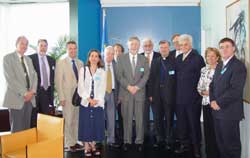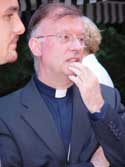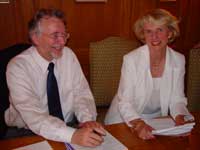Religious Symbols and Religious Commitments in the Public Sphere in Europe
Report on the International Religious Liberty Association’s Board of Experts Meeting, Klingenthal, France, June 17-20, 2004.

The Group of Experts from L to R: M Verfaillie, JP Barquon, A Garay, B Chelini, J Robert, R Torfs, J Graz (IRLA secretary general), M Tyner (IRLA legal counsel), R Minnerath (archbishop of Dijon), C Durham, J Jacques Fritz (host), R de Codes, J Gallagher (deputy secretary general).
The theme of the current round of Experts’ discussion focused on the current controversy engendered by the new French law banning the wearing of “conspicuous” religious symbols in the public school system. Ten papers addressed the various issues of “laicite,” religious freedom, Islam and public order in various European countries, with additional contrast with the experiences outside of Europe.
In its draft statement on the issues, the Board of Experts makes clear its parameters of concern:
“In many countries, especially in those with increasing Muslim populations, concerns have arisen over a number of cases of students wearing Islamic headscarves at school or other religious symbols. Several countries are facing such circumstances (this challenge), and some have adopted specific measures even to the point of prohibiting the wearing conspicuous religious symbols in public schools.

Archbishop of Dijon, Ronald Minnerath, in thinking mode.
“The board of experts of the International Religious Liberty Assocation (IRLA), aware of the importance of the issue, and concerned with the development of the right to religious freedom has met in Klingenthal (Strasburg), France from 17 to 22 June; and has decided to examine the whole question under the light of the general principles of international law and to offer recommendations which could be helpful as guidelines for governments, religious leaders, educational authorities, and public policy makers.”
Examining the various issues involved, and while recognizing the lay history of France and the concept of secularity in Europe, the IRLA Board of Experts concluded that if sustained, the scarf law will reduce religious liberty and create several negative results.
Questions raised during discussion included

IRLA secretary general John Graz with host, Dr. Stinzi.
· Exactly how important is religion in a secular society?
· How much uniformity is necessary?
· What is neutrality?
· When are clothes religiously neutral?
· How can equality of treatment discriminate against those of religious belief?
· How does the state act fairly in a religious and culturally diverse society?
· How does discriminative legislation aid tolerance?
· What does someone owe to a society that denies them equal status?

The Chateau de Klingenthal where the group met in Strasburg, France.
After recognizing the importance of providing a “safe” environment for the educational process, the Experts considered that despite the arguments to the contrary, such attempts to legislate religion out of the public sphere contravened the international safeguards of religious conviction and expression.
“Religious freedom in its manifestation can only be subject to the limitations as defined by the international instruments as prescribed by law and are necessary to protect public safety, health, public morals, or the fundamental rights and freedoms of others. Prohibiting religious symbols without proving these limitations are violations of religious freedom.
“Religious freedom is jeopardized when general regulations made in the name of state secularity exclude the visible manifestation of religious beliefs through symbols and clothing.”
As it discussed possible responses to such restrictions, the Board of Experts urged a non-confrontational approach and resolutions that respected individual rights as guaranteed, for example, by the Universal Declaration of Human Rights.
Participants:
Jean-Paul Barquon
Bert Beach
Blandine Chelini
Cole Durham
Jonathan Gallagher
Alain Garay
John Graz
Jeremy Gunn
Alberto de la Hera
Rosa Maria Martinez
Roland Minnerath
Jacques Robert
Rik Torfs
Mitchell Tyner
Maurice Verfaillie